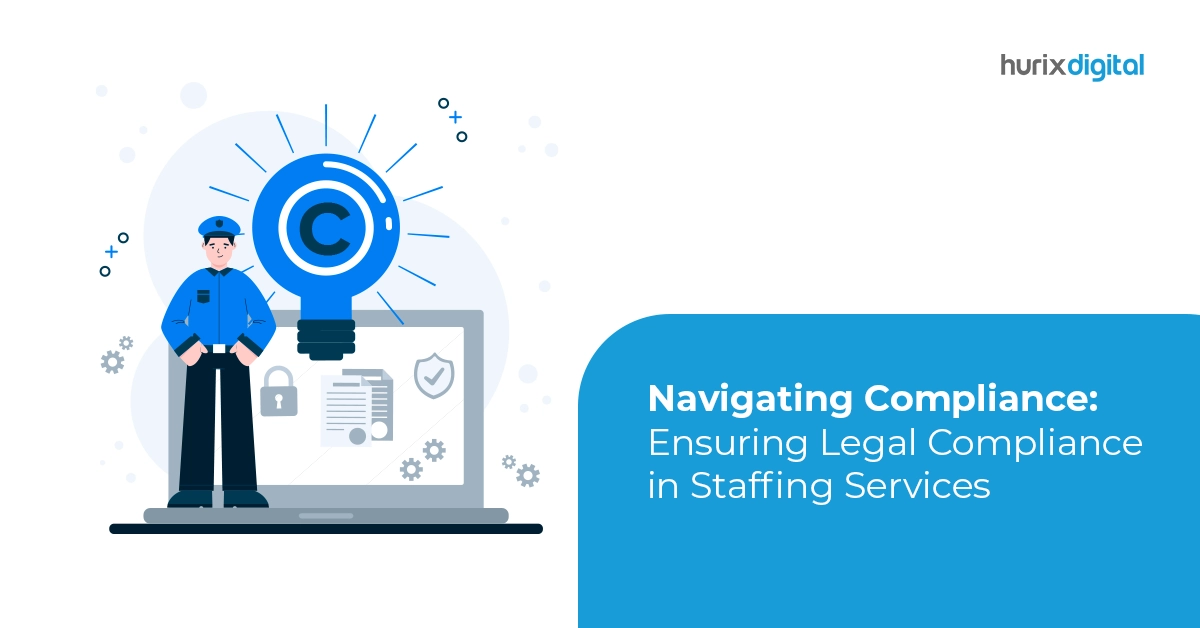
Navigating Compliance: Ensuring Legal Compliance in Staffing Services
Summary
This article explores the importance of ensuring legal compliance in staffing services. It guides on minimizing legal risks and fostering a trustworthy staffing process.
Today, staffing services are instrumental in connecting employers with qualified talent, whether for temporary, permanent, or contractual roles.
Whether it is providing temporary, permanent, or contractual employment, staffing services serve as intermediaries, facilitating the recruitment and deployment of workforce solutions in various industries.
However, despite the complexities of talent acquisition and employment, navigating legal compliance is paramount to upholding ethical standards and fostering a communicative environment.
Research shows that 87% of organizations report negative outcomes of low compliance in businesses. Working with a staffing solutions agency can help you streamline your recruitment process and provide training for legal compliance to ensure great employee retention.
Table of Contents:
- Understanding the Legal Landscape
- What are the Key Areas of Legal Compliance in Staffing Services?
- Mitigating Risks and Ensuring Compliance
- To Wrap Up
Understanding the Legal Landscape
Legal Compliance in staffing services spans a multitude of areas, encompassing federal, state, and local regulations governing employment, labor, and recruitment practices.
There are a myriad of legal requirements, including wage and hour laws, anti-discriminatory laws, and many others, to ensure fair and equitable treatment of workers while mitigating potential liabilities.
Failure to comply with these laws can lead to severe consequences, including legal penalties and potential lawsuits. So, ensure your organization and the staffing agency you work with have a solid understanding of the legal landscape and take proactive steps to adhere to all relevant regulations.
Also Read: The Future of HR: Exploring the Impact of AI Staffing Solutions on Recruitment Efficiency
What are the Key Areas of Legal Compliance in Staffing Services?
Legal compliance in staffing services is important in ensuring that all operations and activities adhere to relevant laws and regulations governing labor, employment, and recruitment.
Here are some key areas of legal compliance in staffing services:
1. Employment Laws and Regulations
Employment laws serve as an important framework governing the relationship between employers and employees, ensuring fair treatment and safeguarding workers’ rights within the workplace.
These regulations encompass various facets, including minimum wage and overtime pay requirements, anti-discrimination measures, and family and medical leave provisions.
Familiarize yourself with various state and federal laws, such as the Fair Labor Standards Act (FLSA), the Americans with Disabilities Act (ADA), the Occupational Safety and Health Act (OSHA), and the Family and Medical Leave Act (FMLA). Compliance with these laws is crucial for employees to maintain a lawful and equitable workplace environment that fosters inclusivity and mitigates legal risks.
2. Classification of Workers
Worker classification pertains to the categorization of individuals engaged in activities as workers or independent contractors.
This classification is important as it delineates the nature of the working relationship, entitlements, obligations, tax responsibilities, and the legal considerations that are associated with each status.
3. Wage and Hour Laws Compliance
Wage and hour laws refer to adhering to regulations governing employee compensation and working hours.
These laws set standards for minimum wage, overtime pay, and other aspects related to employment. Complying with these regulations includes calculating and paying wages, overtime hours worked, and break meal periods.
Failure to comply with these regulations can result in legal penalties and potential lawsuits. Therefore, businesses must stay updated with the rules and regulations and maintain meticulous records to comply with the laws.
4. Anti-discriminatory Laws in the Workplace
Anti-discrimination laws are legislative measures that aim to foster inclusivity and fairness in the workplace by prohibiting discriminatory practices based on race, gender, religion, disability, age, sexual orientation, and other such factors.
These laws mandate equal treatment of all individuals in employment-related matters, including recruitment, hiring, promotion, compensation, and termination. Compliance with these laws is essential for employers during the recruitment process to maintain ethical standards and also prevent legal consequences.
Adhering to legal requirements streamlines business operations by providing clear guidelines and standards. It increases operational efficiency and improves overall productivity.
5. Employee Retention
Health and safety compliance encompasses adhering to regulations and standards to ensure a healthy work environment for employees.
This also includes implementing measures to prevent workplace hazards and providing all the necessary equipment and training required to do the job safely.
Compliance with health and safety regulations is essential to safeguarding employees from harm, mitigating the risks of accidents and injuries, and upholding ethical and legal obligations. It also demonstrates a commitment to employee well-being and fosters a culture of safety within the organization.
6. Adequate Employee Benefits
As a staffing agency, you must comply with the applicable employee benefit laws. These include workers’ compensation, unemployment insurance, and health insurance under the Affordable Care Act (ACA). Failure to comply can lead to legal repercussions.
This creates a positive work environment based on fairness, transparency, and respect for employee rights. It contributes to higher employee satisfaction and reduces turnover costs.
Mitigating Risks and Ensuring Compliance
By implementing proactive measures and best practices, staffing agencies can navigate the complex legal landscape effectively.
Given below are some actionable points to uphold the above-mentioned legal considerations seamlessly:
1. Regular Audits
Conducting regular audits of policies, procedures, and records to identify areas of non-compliance and address them promptly.
Make sure you maintain thorough documentation of these audits and any corrective actions taken, demonstrating a commitment to compliance and risk management.
2. Training Programs
Invest in comprehensive staff training programs to ensure adherence to legal rules and regulations. Also, provide specialized staff training involved in areas such as recruitment, background checks, and contract management to enhance their understanding of compliance requirements specific to their roles.
3. Stay Informed
Staying up-to-date with laws and regulations through continuous educational and professional development initiatives can help mitigate risks. This way, you can ensure that your organization remains proactive in adapting to changes in the legal landscape.
4. Risk Management Strategies
Implement robust risk management strategies to identify, assess, and mitigate risks associated with legal compliance.
5. Policy Review and Update
Regularly review policies and procedures to ensure they align with evolving legal requirements and industrial standards. Also, you can engage legal experts to conduct periodic reviews and provide guidance on compliance matters.
6. Collaborate with Legal Counsel
Collaborate with legal counsel and other associations to gain guidance on complex matters related to staffing services.
7. Proactive Issue Resolution
Address any compliance issue raised by employees, clients, or regulatory standards proactively to maintain transparency and integrity in operations. Also, implement processes for promptly investigating and resolving compliance issues as they arise.
Also Read: The Impact of Globalization on Staffing Solutions: Managing International Talent
To Wrap Up
Legal compliance is integral to the success and sustainability of staffing services.
By navigating the complex legal landscape with diligence and expertise, staffing agencies can withhold ethical standards, mitigate risks, and foster a compliant environment in a business.
Engaging with an efficient staffing solution agency is critical for the growth of your business and this is where Hurix Digital steps in. It can help you by prioritizing compliance as a cornerstone of their operation and navigating challenges effectively in an increasingly regulated environment.
Get in touch with us to learn more!

Currently serving as the Vice President of Technology Delivery Operations at HurixDigital, a prominent global provider of digital content and technology solutions for publishers, corporations, and educational institutions. With over 16 years of experience spanning EdTech and various domains, I hold certification as a SCRUM Product Owner (CSPO). My expertise includes operations, finance, and adept people management skills.




